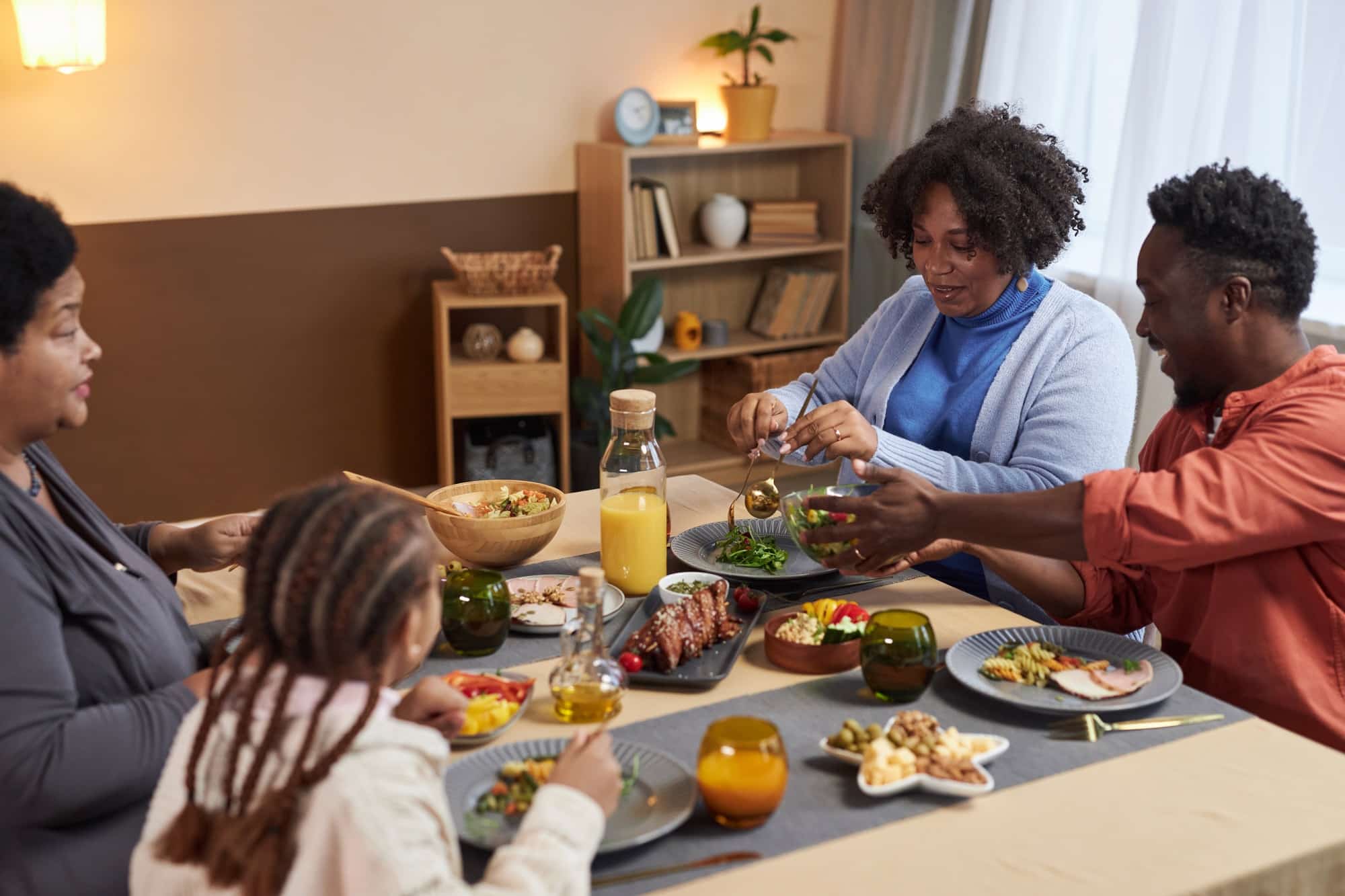A shared meal with someone profoundly impacts our emotional well-being and relationships. Did you know that 70% of individuals feel more emotionally connected to their colleagues after sharing a meal? Even more remarkably, 91% of parents report lower stress levels when eating with their families. These aren’t just statistics; they’re a testament to the power of breaking bread together and fostering deeper connections.
In this Article
The Benefits of Shared Meals: The Magic Unveiled
In summary, the act of sharing meals transcends mere nourishment; it is a vital aspect of human connection. By prioritising shared meals in our daily lives, we can cultivate deeper relationships, foster understanding, and create lasting memories that enrich our lives.
Furthermore, the emotional benefits of sharing meals extend beyond the individuals at the table. When families and friends come together, it creates a supportive atmosphere that encourages open dialogue, allowing individuals to express their thoughts and feelings freely. This is especially important in family settings where children can learn valuable communication skills simply by participating in mealtime discussions.
Sharing a meal with a friend or loved one while engaging in meaningful conversation helps reinforce connections. It turns a simple lunch break into a bonding experience. Consider how a shared lunch break at work can boost morale and enhance productivity, as employees feel valued and connected with their colleagues. These moments spent together foster a sense of community, which is essential for overall well-being.
Moreover, incorporating rituals into our mealtime can enhance the experience further. Whether it’s lighting a candle, playing soft music, or taking a moment to express gratitude for the meal, these small practices can significantly shift our mindset. They remind us to slow down, appreciate what we have, and connect with ourselves and others on a deeper level.
In different cultures, the significance of shared meals varies, but the underlying principle remains the same: food brings people together. For instance, in Italian culture, meals are often lengthy affairs filled with laughter and shared stories, while in Japanese culture, meals are a time for harmony and respect, with an emphasis on presentation and etiquette. Understanding these diverse approaches can enrich our own experiences and highlight the universal importance of shared meals.
Ultimately, the tradition of sharing meals transcends cultural boundaries, highlighting the universal human desire for connection. As we embrace the joy of sharing food, we celebrate not only the nourishment it provides but also the relationships it cultivates.
Additionally, the sharing of food can also serve as a form of communication. In many cultures, food is a language of love and care. Making someone their favourite dish, for instance, speaks volumes about our feelings towards them. It conveys thoughtfulness and consideration, reinforcing emotional bonds and enhancing relationships.
In light of the growing emphasis on mental health in the workplace, shared meals can also play a crucial role in promoting well-being. Taking breaks together for lunch can alleviate stress and serve as an essential reminder to prioritise self-care amidst busy schedules. These shared moments can enhance work-life balance and improve overall morale, making employees feel more connected and valued within their teams.
Moreover, team-building activities centred around shared meals, such as potlucks or lunch-and-learn sessions, can significantly improve workplace dynamics. These events encourage employees to engage with one another outside of their usual roles, fostering creativity and collaboration. It’s a chance for individuals to showcase their culinary skills, learn from one another, and deepen their connections, ultimately leading to a more harmonious work environment.
Furthermore, the practice of sharing meals mindfully allows us to reconnect with our bodies and understand our hunger cues better. It encourages us to savour each bite and appreciate the flavours and textures of our food, leading to a more fulfilling dining experience. This mindful approach can also extend beyond the table, influencing how we interact with food in our daily lives.
Moreover, the act of cooking together can be just as significant as the meal itself. Preparing a dish as a group fosters cooperation and teamwork, reinforcing connections. Picture a group of friends gathered in the kitchen, chopping vegetables and sharing stories as they prepare a meal for a special occasion. These moments of collaboration contribute to building lasting memories and emotional ties.
Additionally, planning celebrated meals during holidays or special occasions can serve as reminders of the importance of connection. Whether it’s a festive Thanksgiving dinner or a birthday celebration with cake and laughter, these gatherings highlight the joy that shared meals bring to our lives and the significance of nurturing our relationships.
Moreover, the act of sharing food can also be a means of cultural exchange. Trying new cuisines with friends or family introduces us to diverse culinary traditions and stories, enriching our understanding of different cultures. This not only broadens our culinary horizons but also deepens our appreciation for the diversity that exists within our communities.
Every shared meal tells a story, rich with tradition, culture, and memory. Whether it’s a Sunday roast enjoyed with family or a casual lunch with friends, the act of eating together cultivates a sense of belonging. For instance, during festive seasons like Christmas, families often gather around the table to enjoy traditional dishes that have been passed down through generations, strengthening familial bonds and creating cherished memories.
Personal Lunchtime Rituals
Taking time for yourself during lunch isn’t just about refuelling – it’s an act of self-care that can transform your entire day. More frequent family meals are associated with improved family functioning and emotional wellbeing, highlighting the importance of shared mealtime in strengthening relationships and reducing stress. Family meal frequency, or how often all or most household members share a meal together, can significantly influence personal eating habits and overall well-being. When you practice mindful eating, savouring each bite and staying present at the moment, you’re not just nourishing your body; you’re creating a peaceful sanctuary in your day. Remarkably, 59% of people make healthier food choices when they eat mindfully with others. This doesn’t just apply to the food we choose but also the environment we create. For example, eating in a tranquil setting, free from distractions, enhances the experience and allows us to fully appreciate our meals.

Creating Emotional Bonds Through Family Meals
The simple act of sharing a meal creates ripples of connection that extend far beyond the table, strengthening family relationships and emotional bonds. Whether you’re cooking together, sharing family recipes, or simply enjoying a meal in company, these moments build the foundation for lasting relationships. These shared experiences become the stories we tell, the traditions we pass down, and the memories we cherish. For example, many families have special recipes that are shared during holiday gatherings, further solidifying their ties and creating a sense of continuity through generations. More frequent family dinners have also been shown to positively impact adolescent well-being, with studies indicating that teens who share meals with their families at least three times a week experience fewer problem behaviors, such as eating disorders and depression, while promoting overall family well-being.
Benefits of Family Meals
Healthy Eating Habits
Family meals are more than just a time to eat; they are an opportunity to foster healthy eating habits that benefit both children and adults. When families gather around the table, they are more likely to enjoy a balanced diet rich in fruits, vegetables, whole grains, and lean proteins. This is because family meals often involve home-cooked dishes, allowing for greater control over ingredients and nutritional content. Parents can model healthy eating behaviors, encouraging their children to try new foods and develop a taste for nutritious options.
Research supports the idea that frequent family meals are linked to a lower risk of obesity and related health issues, such as diabetes and heart disease. This is likely because home-cooked meals tend to be lower in unhealthy fats, added sugars, and sodium, and higher in essential nutrients like fiber, vitamins, and minerals. Establishing these healthy eating habits early on can have long-lasting effects, reducing the risk of chronic diseases and promoting overall well-being. Additionally, efforts to promote family meals are crucial as they encourage healthy eating behaviors and enhance social and emotional well-being.
Positive Impact on Mental Health
The benefits of family meals extend beyond physical health; they also play a crucial role in mental well-being. When families sit down to eat together, they create a space for conversation and social interaction, which strengthens relationships and builds emotional connections. This is particularly important for children, who thrive on positive interactions with family members to develop healthy self-esteem and emotional resilience.
Studies have shown that frequent family meals are associated with a lower risk of depression, anxiety, and other mental health issues in both children and adults. The social support and emotional connection provided by these meals can be a powerful antidote to stress and anxiety. Additionally, the routine and predictability of regular family meals can offer comfort and stability, helping individuals feel more secure and less overwhelmed by daily challenges. More frequent family meals are linked to lower levels of depressive symptoms and stress, highlighting their importance in promoting overall family functioning and emotional wellbeing.
Creating a Positive Family Dinner Experience
Plan Ahead and Keep it Simple
Creating a positive family dinner experience doesn’t have to be complicated. With a bit of planning and a focus on simplicity, you can make mealtime a cherished part of your family’s routine. Here are some tips to help you get started:
- Plan Ahead: Take some time at the beginning of the week to plan your meals and make a grocery list. This ensures you have all the ingredients you need and can help reduce the stress of last-minute meal prep.
- Keep it Simple: Don’t feel pressured to prepare elaborate, multi-course meals. Simple dishes like pasta, tacos, or grilled chicken with vegetables can be just as enjoyable and satisfying. The key is to focus on quality time together rather than the complexity of the meal.
- Involve Your Family: Encourage family members to participate in meal planning and preparation. This can build excitement and anticipation for the meal and teach children valuable skills like cooking and meal planning.
- Make it Fun: Create a pleasant atmosphere by playing music, lighting candles, or setting a nice table. These small touches can make the meal feel special and enhance the overall dining experience.
By following these tips, you can create a positive family dinner experience that promotes healthy eating habits, strengthens family bonds, and supports emotional well-being. Remember, the goal is to enjoy each other’s company and make mealtime a joyful and meaningful part of your day.
Letting Go of Perfection
Letting go of perfection is essential when it comes to family meals. It’s easy to get caught up in the idea that every meal needs to be a perfectly cooked, Instagram-worthy masterpiece. However, this can lead to stress and anxiety, making mealtime a source of tension rather than a time for connection and relaxation.
In reality, family meals don’t have to be perfect to be beneficial. Even simple, everyday meals can provide opportunities for connection, communication, and bonding. By letting go of the need for perfection, families can focus on what really matters: spending time together and enjoying each other’s company.
Research has shown that frequent family meals, regardless of their complexity or perfection, are associated with a range of benefits, including improved mental health, healthier eating habits, and stronger family relationships. So, don’t worry if your meals aren’t perfect – just focus on making time for your family and enjoying each other’s company.
Overcoming Challenges to Family Dinners
Despite the many benefits of family meals, many families face challenges in making them a regular part of their routine. Busy schedules, conflicting work and school commitments, and other obligations can make it difficult to find time for family dinners.
However, with a little creativity and planning, families can overcome these challenges and make family meals a priority. Here are a few strategies to help:
- Plan Ahead: Take some time each week to plan out your meals and make a grocery list. This can help ensure that you have the ingredients you need and can make mealtime less stressful.
- Keep it Simple: You don’t need to make a complicated, multi-course meal to have a successful family dinner. Simple meals like pasta, tacos, or grilled chicken can be just as enjoyable and beneficial.
- Involve Everyone: Encourage all family members to participate in meal planning and preparation. This can help make mealtime more enjoyable and give everyone a sense of ownership and responsibility.
- Be Flexible: Don’t be too hard on yourself if you can’t make family meals happen every night. Even a few meals per week can be beneficial, and you can always adjust your schedule as needed.
By overcoming the challenges to family dinners, families can reap the many benefits of regular family meals and create lasting memories and traditions.
Cultivating Connection in the Workplace for Mental Health
The impact of shared meals at work is nothing short of remarkable. Infrequent family meals may reflect higher stress levels among parents, impacting overall family well-being. Teams that share healthy lunches see a 20% increase in productivity, but the benefits go well beyond numbers. These moments of connection create opportunities for authentic conversation, building trust and understanding that transform workplace relationships. When colleagues break bread together, they’re not just sharing a meal but building a more robust, collaborative work environment. This is especially important in today’s diverse workplaces, where a sense of community can greatly enhance job satisfaction and employee retention.
Mindful Eating for Emotional Well-being and Healthy Eating
Taking time to eat mindfully isn’t just about enjoying your food – it’s about creating a positive relationship with nourishment and connection. This practice becomes especially powerful when shared with others. By engaging in meaningful conversations during meals, we create an atmosphere of openness and trust, essential for fostering emotional well-being. Sharing our thoughts and experiences over a meal can lead to deeper understanding and empathy, further enriching our relationships.
Building Lasting Family Relationships
The beauty of shared meals lies in their simplicity and accessibility. Whether planning regular family dinners, organising team lunches, or simply enjoying a meal with friends, you invest in relationships that matter. These moments of connection reduce chronic stress, increase life satisfaction, and create the kind of bonds that make life richer and more meaningful. Think about how sharing a meal can create a wholesome environment where everyone feels valued and included, thereby enhancing overall happiness.
Remember, it’s not about creating perfect meals or elaborate gatherings. The magic happens by coming together, sharing food, and making space for connection. So, consider inviting someone to join you next time you sit down for a meal. In our fast-paced world, these moments of shared nourishment might be the most powerful way to build the connections we crave. Embrace the imperfections and relish in the authenticity of shared moments, as they often lead to the most memorable experiences.
Whether strengthening family bonds, building workplace relationships, or deepening friendships, shared meals offer a beautiful opportunity to nourish your body and soul. So here’s to the joy of breaking bread together – may your table be filled with good food, warm conversation, and the connections that make life truly meaningful. In our increasingly disconnected world, let us remember the power of a meal shared, a moment cherished, and a relationship nurtured.
Related Posts
- 3 Healthy Parfait Ideas For Summer Guilt-Free Snacking
- 5 Simple Bento Box Lunches Everyone Will Love
- 30 Best Work No Microwave Lunch Ideas
- Delicious Low-Glycemic Japanese Cuisine: Tasty Meals for Blood Sugar Control
- 15 Easy International Lunch Ideas That Will Make Your Kid the Envy of the Cafeteria
- 2025 Passover Meal Guide for Keto, Paleo, and Diabetic Diets: What to Eat and What to Avoid
- Murray’s Restaurants History : The Heart of Canadian Comfort Food
- Elevate Your Cucumber Sandwiches: 5 Stunning Slicing Techniques









